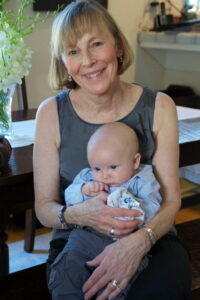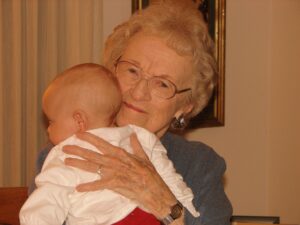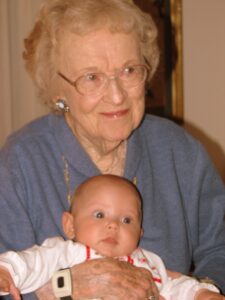

THE GRANDMOTHER HYPOTHESIS
In the 1980s, anthropologist Kristin Hawkes and her colleagues studied the Hadza tribe, the last known hunter-gatherers in Tanzania, Africa. Their findings:
1. the tribe’s old women did not just rest, they worked, digging up a deeply-buried tuber (potato) which provided the main source of starch for the tribe’s diet.
2. and though the young women also dug the tubers, the older women spent more time at this task, leaving early in the morning and coming back late in the evening.
3. and because of the needed presence of this food in their diet, the grandchildren of these older women had better growth rates.
From these observations, came the “grandmother hypothesis.”
Simply stated: as the species progressed, women past childbearing age helped not just their children, but also their grandchildren.
They strengthened the genealogy of the family, insuring that the line would continue. Anthropologists concluded, that having this role or purpose eventually lengthened the older women’s life span. When no longer required to carry an infant around, they were freed up to do work that helped their progeny. And very importantly, by foraging for more food, they prevented their grandchildren from dying. All generations prospered, as the lengthening of the life span was then passed on.
THE HUMAN SPECIES
The researchers also stressed that the “grandmother hypothesis” clarified why humans are able to have children in quick succession, whereas in other species there are long gaps.
Example: chimp mothers wait 5 or 6 years to give birth to another neonate. But in humans, with tribal grandmothers available, the younger women could continue to have children. This collaborative child-rearing allowed the young woman to focus on the next baby, while the grandmother took care of the toddlers. That is certainly a good way to maintain the species.
Judith Anne Shulevitz, a journalist and culture critic who has studied the “grandmother hypothesis”, believes that another very positive reason for grandmothers, is that their presence in a family unit changed humans in another way.
It made their brains bigger. As life lengthened, so did each stage of it. Children stayed children longer, which let their brains develop a more complex neural architecture. Fascinating!
WHY GRANDPARENTING IS SO IMPORTANT
Some anthropologists believe that the presence of grandparents is the most important family role of the new century; that in a society where many women have to work or choose to work, daycare centers, schools and grandparents often replace the role of the parent. Grandparents can bring much to the children whose parents are stressed and often emotionally unavailable because of work schedules and concerns for providing basic needs. In these cases, grandparents are vital in helping a family thrive.
Children need guidance, love and someone to listen to their fears and worries. Grandparents easily become that source and a bond forms, allowing for future communication.
Grandparents can babysit, allowing stressed moms and dads a chance to get away and relate to one another.
Grandparents can relate family stories, creating a history that forges a bond and provides a child with a sense of place and security.
Grandparents can be role models for their children’s parenting and for their grandchildren’s relationships with others. The love and gentleness found in the home is the first step to forming good citizens of the world, who will have their own relationships and build their own families in the decades ahead.
IT IS TRULY ALL ABOUT FAMILY
There’s the familiar line: “If I’d known how wonderful it is to have grandchildren, I would have had them first.”
What’s that about? Probably that with grandchildren comes experience, confidence in the role to be played, freedom from the harder aspects of child-rearing and the amazing chance to see once again the future in a child’s eyes.
Certainly some grandparents have more nitty-gritty responsibility for their grandchildren than others. Some are doing much of the raising and rearing. Some show up only for the fun times, like birthdays and holidays.
But hopefully, most grandparents find the middle acceptable ground–they are eager to role up their sleeves and help when needed and they are always desirous of telling family stories, reading well-loved books, taking exploratory walks and singing songs.
It’s a little like reliving your parenting. It’s a lot like looking into the future, and once again having that uplifting feeling of knowing something of you will live on. That’s truly important.
HAPPY MOTHER’S DAY and HAPPY GRANDMOTHER’S DAY



9 Responses
I’ve been studying the legacy of the grandmothers in my own motherline, especially those who also knew their great grandchildren. What do we inherit from them other than mtDNA. I may explore this one in free verse, another “Leora book.”
HI JOAN, I wrote you through email, but thought I would say THANKS AGAIN here. Happy Mother’s Day, Beth
Can’t wait to become a grandmother! My kids love my mom and are very close to her. Grandmothers are vital.
I only knew my one grandmother, and she was wonderful. As for being one? IT IS AWESOME.
I love this and I can see how it worked in my own family
That’s a lovely response. Losing my father at such an early age meant that my mother relied on extended family.
Thus, my grandmother and aunts were always there, paying tuition, exclaiming over report cards. They were wonderful.
We old ladies are important. I’m finally going to be a grandmother. Can’t wait but I think I will be in for a whole lot of work.
Hi Rebecca, Congratulations. Being a grandmother is wonderful, but I never lived next-door to my grandchild and that helps.
Often, they came and stayed with us. It was fun. As life proceeds, you need to set limits. Your child should not count on you
becoming the 24 hour babysitter, UNLESS that is what YOU want. Beth
Congratulations!! It is awesome work. Just set limits.